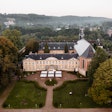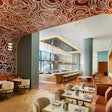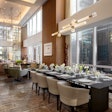Just because the city is quiet and Congress gets a recess doesn’t mean event planners are in sleep mode. We asked some local experts, what are you up to this summer?
“Our business is never slow. We're a global company that never closes; we're always running at 200 miles per hour. Of course we go on vacation, [but] this summer we have to launch three new Web portals in Europe.”
—David Shackley, vice president of brand marketing, promotions, and events, AOL
“Frankly, summer is planning time for a year of events for us, so it’s not really downtime. When I can get away, it’s my only opportunity to visit friends and family.”
—Patti Humphrey, director of special events, Washington National Opera“Well, it's not as slow as it once was. When I started planning events here in 2001, June parties were simply unheard of. Now June is a full-blown social month! During July and August, I try to play catch up with everyone that I've been too busy to have face time with since January. Most of all, I’m getting my ducks in a row for Capitol File's exciting fall season.”
—Jayne Sandman, associate publisher, Capitol File
“I love summer in Washington because everyone seems to leave town. Since the events I work on require a lot of preparation and planning, I use this quiet time to set the groundwork for the upcoming events by contacting potential sponsors, securing auction items, and working with our creative department on the print elements. I also try to get in as much 'me' time as possible because there will not be any once fall arrives.”
—Jeanie Torchio, senior regional event specialist, ALSAC/St. Jude Children's Research Hospital
“Downtime? What downtime? [The Air Force Association’s] schedule of national programs and local meetings and events are spread out over the year. We go from busy to warp speed.”
—Mary Ellen Dobrowolski, director of programs and industry relations, Air Force Association
“I typically work a four-day week in the summer and retreat to the beach for long weekends with my dog and friends. During the week, I have interns who help with general cleanup and filing.”
—Leslie Zeck, manager of events and conferences, American Red Cross
“It is good to have downtime to gear up for fall programs—a great time to get organized and take care of all the little details.”
—Michelle Mobley, director of special projects, Heart of America
“Unfortunately, for me, this is my busiest time of year as our 20,000-person annual meeting [was at] the end of July. [This month], I am busy with our next year's convention committee and the wrap-up from the July meeting. If I had downtime in the summer, I would spend the time sampling all the new restaurants in town when you can most likely get a reservation and enjoy the museums and the beach.”
—Gail E. Mutnik, director of meetings, American Association for Clinical Chemistry
“At work, we use the downtime to our advantage to plan for the next season. On a personal level, I reconnect with family and friends, go on vacation, and catch up on my hobbies—i.e. reading, quilting, and biking, just to name a few.”
—Jennifer Bristow, manager of special events, the Washington Ballet
“Yes, summer in Washington is notoriously slow, however I jump from one event to another so there’s not much downtime for me. I’m currently planning our fall Sporting Clays Invitational and our 2008 spring gala featuring Turkey as our host country. And I’m always thinking of new event prospects and looking at beneficiary events.”
—Linda Chastain, director of special events, Cancer Research and Prevention Foundation
“Summer is a great time to catch up with friends and colleagues after work, preferably somewhere outside with a great view of the city, or over brunch on the weekend. It is also fun to catch one of the city's amazing exhibitions (please allow me to plug the Corcoran Gallery of Art!) on a Thursday evening or during the weekend. Day trips to Annapolis or Mount Vernon or out to Virginia wineries help to feel [like an] escape from the city. And personally, it's a great time to try to get out of the office when it is still daylight and run near the monuments and the Mall.”
—Rebecca Gentry, vice president of institutional advancement, the Corcoran Gallery of Art
“Our business is never slow. We're a global company that never closes; we're always running at 200 miles per hour. Of course we go on vacation, [but] this summer we have to launch three new Web portals in Europe.”
—David Shackley, vice president of brand marketing, promotions, and events, AOL
“Frankly, summer is planning time for a year of events for us, so it’s not really downtime. When I can get away, it’s my only opportunity to visit friends and family.”
—Patti Humphrey, director of special events, Washington National Opera“Well, it's not as slow as it once was. When I started planning events here in 2001, June parties were simply unheard of. Now June is a full-blown social month! During July and August, I try to play catch up with everyone that I've been too busy to have face time with since January. Most of all, I’m getting my ducks in a row for Capitol File's exciting fall season.”
—Jayne Sandman, associate publisher, Capitol File
“I love summer in Washington because everyone seems to leave town. Since the events I work on require a lot of preparation and planning, I use this quiet time to set the groundwork for the upcoming events by contacting potential sponsors, securing auction items, and working with our creative department on the print elements. I also try to get in as much 'me' time as possible because there will not be any once fall arrives.”
—Jeanie Torchio, senior regional event specialist, ALSAC/St. Jude Children's Research Hospital
“Downtime? What downtime? [The Air Force Association’s] schedule of national programs and local meetings and events are spread out over the year. We go from busy to warp speed.”
—Mary Ellen Dobrowolski, director of programs and industry relations, Air Force Association
“I typically work a four-day week in the summer and retreat to the beach for long weekends with my dog and friends. During the week, I have interns who help with general cleanup and filing.”
—Leslie Zeck, manager of events and conferences, American Red Cross
“It is good to have downtime to gear up for fall programs—a great time to get organized and take care of all the little details.”
—Michelle Mobley, director of special projects, Heart of America
“Unfortunately, for me, this is my busiest time of year as our 20,000-person annual meeting [was at] the end of July. [This month], I am busy with our next year's convention committee and the wrap-up from the July meeting. If I had downtime in the summer, I would spend the time sampling all the new restaurants in town when you can most likely get a reservation and enjoy the museums and the beach.”
—Gail E. Mutnik, director of meetings, American Association for Clinical Chemistry
“At work, we use the downtime to our advantage to plan for the next season. On a personal level, I reconnect with family and friends, go on vacation, and catch up on my hobbies—i.e. reading, quilting, and biking, just to name a few.”
—Jennifer Bristow, manager of special events, the Washington Ballet
“Yes, summer in Washington is notoriously slow, however I jump from one event to another so there’s not much downtime for me. I’m currently planning our fall Sporting Clays Invitational and our 2008 spring gala featuring Turkey as our host country. And I’m always thinking of new event prospects and looking at beneficiary events.”
—Linda Chastain, director of special events, Cancer Research and Prevention Foundation
“Summer is a great time to catch up with friends and colleagues after work, preferably somewhere outside with a great view of the city, or over brunch on the weekend. It is also fun to catch one of the city's amazing exhibitions (please allow me to plug the Corcoran Gallery of Art!) on a Thursday evening or during the weekend. Day trips to Annapolis or Mount Vernon or out to Virginia wineries help to feel [like an] escape from the city. And personally, it's a great time to try to get out of the office when it is still daylight and run near the monuments and the Mall.”
—Rebecca Gentry, vice president of institutional advancement, the Corcoran Gallery of Art



















!['The Cathedral of St. John the Divine [in New York] is such a striking hidden gem and one of my favorite event venues in the city,' says Tinsel Experiential Design's Erica Taylor Haskins.](https://img.bizbash.com/files/base/bizbash/bzb/image/2024/09/_M627287_pano.66db3413ac491.png?auto=format%2Ccompress&fit=crop&h=112&q=70&w=112)